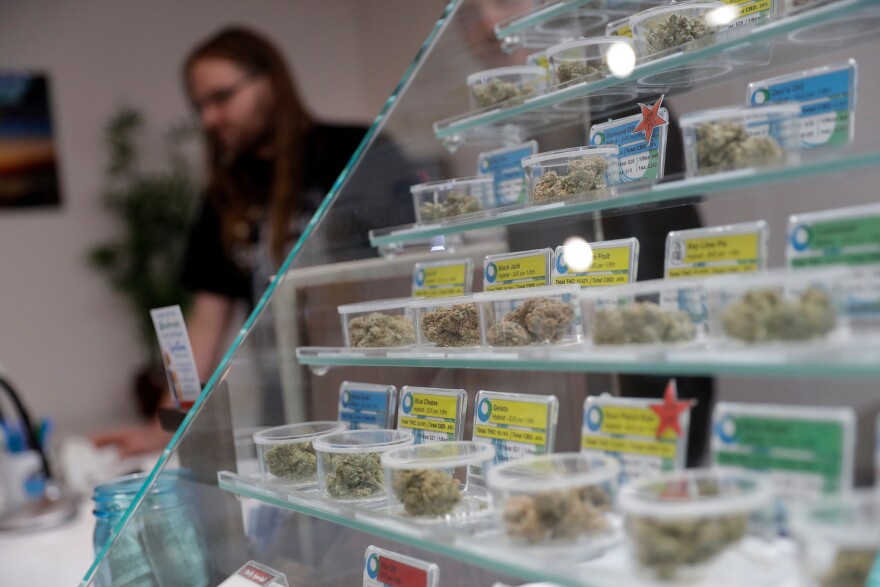The Legislature’s second attempt to setup the market and regulatory system for the retail sale of recreational marijuana is already faring better than its first.
The House voted 112-34 Tuesday to pass a major rewrite of the law voters approved nearly two years ago. Additional votes are needed, but the margin in the House suggests the votes are there to override a potential veto by Republican Gov. Paul LePage.
Some legal cannabis advocates warn, however, that efforts to broaden political support for the proposal could have negative consequences.
For independent Rep. Kent Ackley of Monmouth, the Legislature’s latest bid to create a legal market for cannabis could resolve what has been a 17-month legislative odyssey marked by fits, starts and, so far, failure.
“My hope is that every member in this body can go home at the end of this session with the ability to tell the voters in each of our districts that we finished the job that they started in Nov. 2016,” he said.
Ackley is a part of the special committee that has spent more than a year attempting to create guidelines for the recreational market — everything from determining who gets a license and setting tax rates to establishing labeling standards on packaging. The resulting bill — the committee’s second — makes sweeping changes to the marijuana law voters ratified in 2016.
The bill keeps a 10 percent retail sales tax, but adds an excise tax on wholesale transactions — a 20 percent effective rate that analysts predict could bring in over $16 million during the first full year of sales. It cuts in half the number of flowering plants a Maine adult can cultivate for personal use, from six plants to three.
The bill also eliminates cannabis social clubs, while also requiring cities and towns to take affirmative action to allow cultivation, wholesaling and retail operations. And it includes significant modifications to last year’s proposal, which also attempted rewrite the voter-approved law, but ultimately failed passage after it was vetoed by the governor.
Unlike last year’s bill, there’s no longer a provision that would have shared tax revenue from cannabis sales with cities and towns, leaving some to question the viability of the legal market if most municipalities opt out without a financial incentive to participate.
But those changes helped win over Republicans like Assistant Minority Leader Rep. Ellie Espling of New Gloucester — that is, lawmakers who oppose legal marijuana but who also want strict regulations if it’s going to be legal under state law.
“I need this to be as strict and as stringent as possible. I need real protections in this for my family. And I think Mainers are asking for that,” she said.
Espling was among over 50 Republicans who supported the bill on Tuesday. Only four voted for the last proposal.
But the effort to court support from the GOP and bring closure to the tortured regulatory overhaul has left some legal cannabis supporters worried.
“I moved to Maine in 2013 for my daughter Cyndimae to have access to the medical marijuana program,” said Susan Meehan of Augusta.
Meehan moved to Maine from Connecticut because her daughter suffered from a rare form of epilepsy. Her daughter died two years ago, but Meehan said medical cannabis did for Cyndimae what over 20 antiepileptic drugs could not: it controlled her seizures without the unresponsiveness and detachment caused by pharmaceuticals.
Meehan and the group Maine Children for Cannabis Therapy worry about a provision in the recreational cannabis bill that moves oversight of the medical program to the agency that regulates alcohol sales. She said states like Oregon have made similar moves and it has affected the testing and availability for the highly specialized cannabis her daughter once needed.
“Because they’re not growing specifically to meet the needs of Kaylee, or of Mitchell or of Danyon. They’re growing to meet the recreational need and the high THC values that sell,” she said.
The medical marijuana oversight change was among several provisions that prompted no votes from lawmakers who have long supported legal cannabis, like Democratic Rep. Craig Hickman of Winthrop.
During the floor debate, Hickman cited a slew of legal cannabis regulations that he supports.
“And because I stand in support of all those things and many more, I stand in opposition to the pending motion,” he said.
For now, Hickman is among the minority of lawmakers who oppose the bill. It now moves to the Senate, which is expected to approve it.



